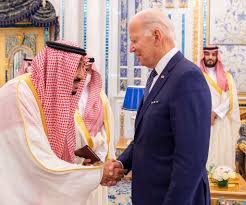Saudi Arabia is choosing friends on its own terms and Biden is not one of them

Saudi Arabia is choosing friends on its own terms and Biden is not one of them
Martin ChulovMiddle East correspondent
Reactions in Washington to slashing oil supply have not concerned Mohammed bin Salman; nor have the optics of indirectly boosting Putin’s war
Mohammed bin Salman had seen it coming. The groundswell of anger in Washington was clear and building since he helped lead an Opec+ decision to cut the world’s oil supply last week.
But for the first time in the modern era of ties between the US and Saudi Arabia, there was no rush to placate hard feelings, or gloss over a rift. This was the birth of a new realpolitik, where nascent Saudi nationalism paid no heed to a historical ally and instead aligned itself to what Riyadh literally sees as a new world order.
Saudi Arabia will face ‘consequences’, says Biden, amid anger at cuts in oil output
The decision by Opec+ – the oil production cartel led by Saudi Arabia, plus Russia – was the clearest sign yet that relations between Washington and Riyadh have reached a nadir and, perhaps more importantly, that such a situation does not overly concern the de facto Saudi leader. For months before Joe Biden’s July visit to Jeddah and especially in the three months since, Saudi social media was buzzing with talk of a “swagger” shown by Prince Mohammed and, by extension, Saudi Arabia. The 37-year-old heir to the throne had used the time to stake out what a kingdom on his watch would look like and how it would project.
Riyadh would no longer be a Flintstones-like theocracy that eschewed progress and hid behind a US security umbrella, he insisted, but a wealthy middle power in its own right that chose its friends, on its own terms. Biden, who had described the crown prince as a pariah that he would avoid while in office, was not to be one of them.
Oil, the biggest tool in its basket of offerings, was no more to be a prize doled out to friends at mates’ rates, but an instrument to be weaponised – for Saudi interests. The new stances shattered accommodations that had underwritten bilateral relations between the US and Saudi Arabia, in particular an informal pact that had guaranteed the kingdom’s security in return for keeping the oil valves open and – when it mattered – bowser prices low.
Such new positions in isolation would have been uncomfortable enough for a US government that had come to take as a given that Riyadh would have its back when it mattered. But in the context of Russia’s war in Ukraine a new geopolitical dynamic has emerged. In cutting output to keep prices high, Saudi Arabia has allied with Russia and, in doing so, indirectly boosted Vladimir Putin’s war effort, just as the Russian leader was foundering.
Riyadh has countered by saying that the decision to slash output by 2m barrels was purely commercial and suggested it needed an oil price of around $100 to sustain the enormous investments the kingdom has made across Saudi Arabia to fund economic and cultural programs. There is indeed a business case to be made for a higher price per barrel, but Prince Mohammed’s risk/reward ratio has clearly been recalibrated.
The prince is sticking to a position that Saudi Arabia chooses its own friends through the lens of its interests
At nearly all points in the past 70 years, Riyadh would have thought twice before making such a move, or at least tried to explain its imperatives to Washington before doing so. The optics this time were always going to reflect that this was a vote for Putin, and a disendorsement of Biden, who now faces the prospect of taking higher pump prices to midterm elections in November.
Prince Mohammed’s critics in Washington, and particularly among Democrats, have accused him of direct interference in a US election, a move that would carry great weight. Whether true, or not, Biden has taken the apparent snub personally and is now threatening to rewrite the relationship in ways that Riyadh could potentially find uncomfortable, including stopping weapons sales.
Saudi Arabia has had constant access to cutting edge US weaponry for decades, and its security has been underwritten by US technology and troops on ground for the past 30 years. The anger of Biden and the Democrats appears to place that in jeopardy.


